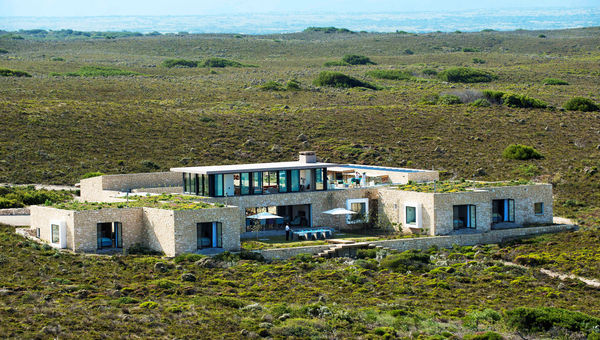Situated on South Africa's southern coast, De Hoop Nature Reserve offers a memorable conservation experience, one that many travelers may not know exists. Lesser known than Kruger or Table Mountain National Park, this 140-square-mile reserve near Cape Town protects diverse ecosystems and wildlife. Marine walks reveal vibrant rock pools teeming with anemones, mussels and colorful starfish. On land, herds of bontebok antelope roam while rare Cape vultures soar over fynbos-cloaked mountains. De Hoop is a nature lover's paradise.
As a marine protected area, the reserve provides some of South Africa's best land-based whale watching. Every year from June to November, southern right whales migrate to the sheltered bays along the coastline, with one of the largest congregations of 300 to 500 whales gathering at De Hoop. For up-close encounters with marine life, interpretive rock pool walks led by guides reveal this hidden world.
• Related: Ecofriendly trends in Africa travel
The reserve also provides habitat to an array of wildlife, including bontebok antelopes and Cape mountain zebras as well as elands and grey rheboks antelopes, baboons and yellow mongooses. A unique offering is the Vulture Experience, a guided hike up to the Vulture Deck on Potberg Mountain where guests can watch these magnificent birds swoop and soar.
With rugged coastlines, wetlands and fynbos-covered peaks, the reserve offers diverse hiking trails. A new guided multiday hike, De Hoop Trail: Vlei to Whales, winds about 23 miles from the wetland, or vlei, to the ocean, where numerous whales are sure to be seen. During the walk, travelers can uncover the reserve's natural and cultural history while observing its diverse marine and wildlife.
The primary accommodation for the Vlei to Whale experience is De Mond Villa, the newest addition from the De Hoop Collection, which manages the tourism activities and accommodations within the reserve. Located on the edge of the Ramsar-listed wetland, the recently restored, five-bedroom villa provides an exclusive, off-the-grid blend of authenticity, luxury and comfort. It also offers WiFi, a private outside area with braai facilities (like a fire pit), a swimming pool and spectacular views.

The four-bedroom Morukuru Ocean House, which opened in 2014, is a fully off-grid property that relies on solar power and borehole water. Photo Credit: Morukuru Family
For those wanting to take conservation a step further, Morukuru Family's Coastal Conservation With a Purpose package provides immersive sustainability activities. Guests can help clear invasive plants, learn about off-the-grid operations and visit the Two Oceans Aquarium's turtle rescue program. Since 2022, Morukuru has collaborated with the aquarium to establish De Hoop as an official turtle release site. Travelers can get hands-on with rehabilitation and even assist in a release. Beyond educational activities, the package focuses on immersing guests in the area's ecology through guided fynbos walks, marine explorations and whale watching.
For discerning travelers seeking a vacation with purpose, the Coastal Conservation With a Purpose add-on provides a meaningful way to engage with and support De Hoop's heritage. Blending luxury accommodations with conservation activities, the package offers an impactful southern Africa escape.
• Related: Seychelles strives for 'a better kind of tourism'
Morukuru follows the "low impact, high yield" principle with strict building regulations. The four-bedroom Morukuru Ocean House opened in 2014, followed by the five-suite Morukuru Beach Lodge in 2018. Both fully off-grid properties rely on solar power and borehole water. Local materials were used, including fynbos that was removed from surrounding areas and replanted on the Ocean House's roof. When designing Beach Lodge, the architect worked around a protected Milkwood tree that could not be cut or harmed.
But beautiful scenery and remote accommodations aren't the only draws in De Hoop. In January this year, the reserve
unveiled the "Origins of Early Southern Sapiens Behavior" exhibition,
curated by Craig Foster, star of the Oscar-winning 2021 best documentary
feature "My Octopus Teacher." Showcasing discoveries like the Blombos
Cave occupied by humans over 100,000 years ago, this exhibit highlights
the reserve's archaeological heritage and connection to our ancient
past. The exhibit, which will be managed and maintained for an initial three-year period by the De Hoop Collection team, is free for De Hoop overnight guests. Day visitors will pay a $10 fee to enter.
Whether travelers crave sweeping coastal vistas, up-close wildlife encounters or the chance to explore their human origins, De Hoop delivers an impactful escape. Travelers can immerse themselves in this untamed landscape and understand why early humans chose to settle in this diverse paradise over 100,000 years ago.